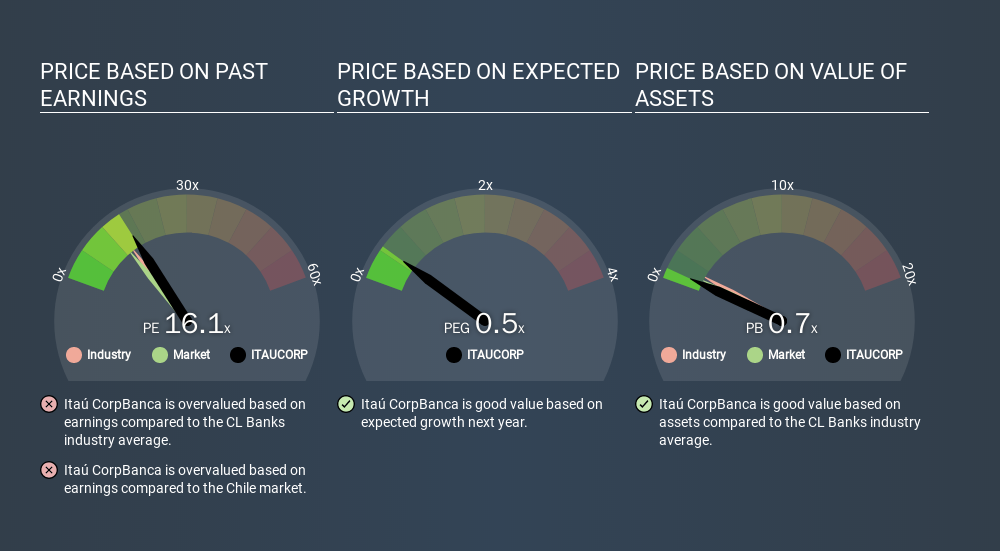Is Itaú CorpBanca's (SNSE:ITAUCORP) High P/E Ratio A Problem For Investors?

The goal of this article is to teach you how to use price to earnings ratios (P/E ratios). We'll apply a basic P/E ratio analysis to Itaú CorpBanca's (SNSE:ITAUCORP), to help you decide if the stock is worth further research. Itaú CorpBanca has a price to earnings ratio of 16.10, based on the last twelve months. In other words, at today's prices, investors are paying CLP16.10 for every CLP1 in prior year profit.
Check out our latest analysis for Itaú CorpBanca
How Do I Calculate Itaú CorpBanca's Price To Earnings Ratio?
The formula for price to earnings is:
Price to Earnings Ratio = Share Price ÷ Earnings per Share (EPS)
Or for Itaú CorpBanca:
P/E of 16.10 = CLP4.56 ÷ CLP0.28 (Based on the trailing twelve months to November 2019.)
Is A High Price-to-Earnings Ratio Good?
A higher P/E ratio means that buyers have to pay a higher price for each CLP1 the company has earned over the last year. That isn't a good or a bad thing on its own, but a high P/E means that buyers have a higher opinion of the business's prospects, relative to stocks with a lower P/E.
How Does Itaú CorpBanca's P/E Ratio Compare To Its Peers?
The P/E ratio essentially measures market expectations of a company. The image below shows that Itaú CorpBanca has a higher P/E than the average (14.1) P/E for companies in the banks industry.

That means that the market expects Itaú CorpBanca will outperform other companies in its industry. The market is optimistic about the future, but that doesn't guarantee future growth. So investors should delve deeper. I like to check if company insiders have been buying or selling.
How Growth Rates Impact P/E Ratios
Probably the most important factor in determining what P/E a company trades on is the earnings growth. That's because companies that grow earnings per share quickly will rapidly increase the 'E' in the equation. Therefore, even if you pay a high multiple of earnings now, that multiple will become lower in the future. A lower P/E should indicate the stock is cheap relative to others -- and that may attract buyers.
It's great to see that Itaú CorpBanca grew EPS by 15% in the last year. And it has improved its earnings per share by 99% per year over the last three years. This could arguably justify a relatively high P/E ratio. In contrast, EPS has decreased by 91%, annually, over 5 years.
Remember: P/E Ratios Don't Consider The Balance Sheet
The 'Price' in P/E reflects the market capitalization of the company. That means it doesn't take debt or cash into account. The exact same company would hypothetically deserve a higher P/E ratio if it had a strong balance sheet, than if it had a weak one with lots of debt, because a cashed up company can spend on growth.
Such spending might be good or bad, overall, but the key point here is that you need to look at debt to understand the P/E ratio in context.
How Does Itaú CorpBanca's Debt Impact Its P/E Ratio?
Itaú CorpBanca has net debt worth a very significant 298% of its market capitalization. This is a relatively high level of debt, so the stock probably deserves a relatively low P/E ratio. Keep that in mind when comparing it to other companies.
The Verdict On Itaú CorpBanca's P/E Ratio
Itaú CorpBanca's P/E is 16.1 which is above average (13.1) in its market. It has already proven it can grow earnings, but the debt levels mean it faces some risks. It seems the market believes growth will continue, judging by the P/E ratio.
Investors have an opportunity when market expectations about a stock are wrong. If the reality for a company is better than it expects, you can make money by buying and holding for the long term. So this free visualization of the analyst consensus on future earnings could help you make the right decision about whether to buy, sell, or hold.
Of course, you might find a fantastic investment by looking at a few good candidates. So take a peek at this free list of companies with modest (or no) debt, trading on a P/E below 20.
If you spot an error that warrants correction, please contact the editor at editorial-team@simplywallst.com. This article by Simply Wall St is general in nature. It does not constitute a recommendation to buy or sell any stock, and does not take account of your objectives, or your financial situation. Simply Wall St has no position in the stocks mentioned.
We aim to bring you long-term focused research analysis driven by fundamental data. Note that our analysis may not factor in the latest price-sensitive company announcements or qualitative material. Thank you for reading.
About SNSE:ITAUCL
Banco Itaú Chile
Provides various banking services in Chile and Colombia.
Very undervalued with proven track record.
Similar Companies
Market Insights
Community Narratives



